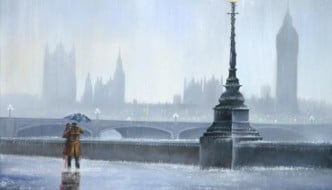
James Mason is a PhD Researcher at University of Leeds. TSOTA caught up with James to find out more about his fascinating research and all things Disney.
TSOTA: Can you tell us a bit about your PhD research? What do you hope to find out?
JM: My PhD research concerns the relationship that adult film audiences have with Disney films. When people talk about ‘Disney films’ they’re often just referring to animation, and Disney has become synonymous with children’s entertainment. However, animation is just one part of the Disney story, as the company has produced hundreds of live-action films and documentaries covering many different genres. Many adults derive a lot of pleasure from Disney films – and not just those adults who watch alongside their children and grandchildren.
Disney manufactures many products inspired by their films that are targeted at adult audiences, such as clothing, collectible ornaments and books of art. It can still be difficult, though, to be seen to be an adult fan of Disney, as if drawing pleasure from a source that is seen as being inherently child-friendly, and potentially childish, makes the viewer somehow childish. You also hear adults describe Disney as a ‘guilty pleasure’, a term I really don’t like, as it suggests you should feel guilty about enjoying something. And why should you?! I hope to get an idea of how and why adults enjoy Disney films, despite their child-friendly reputation.
TSOTA: What inspired you to first want to study this subject?
JM: I was inspired to study Disney because I’m generally fascinated by the company and the films it makes. I specifically wanted to look into adult audiences because I’m a 31 year old man, and I enjoy Disney films, and I know many other adults who do too. Yet, sometimes even I am a bit reluctant to admit I like Disney films, even in the world of academia, where studying pop culture can be considered somehow trivial. I’m fascinated by the abundance of Disney quizzes that are shared on social media, the lists of ‘Disney princesses as luke-warm bowls of water’, and some of the more risque images of Disney’s characters that are produced by ‘fans’ – what is it about Disney that inspires grown adults to engage in these activities?
TSOTA: Why and how is Disney so important to our culture?
JM: Disney is a large, practically inescapable part of children’s culture, and those children grow into adults, often parents, and they share the Disney connection with new generations. Disney films have been around since 1937 and the release of Snow White and the Seven Dwarfs, and even earlier in short cartoon form, and they’re still here, in evolving forms. The old ‘classics’ get re-released on DVD and download, and new films are produced every year. While animation is still a big part of Disney’s film output – you may have heard of a little film called Frozen that was quite successful in recent years – they also now own Marvel Studios and Lucasfilm, the studio behind another small film, Star Wars: The Force Awakens. It’s not often you can go to the cinema these days and not find a movie playing that is owned by one of Disney’s studios.
TSOTA: Do you have a favourite Disney character? How about a Disney song?
JM: I don’t have a particular favourite Disney character, although my favourite Disney film is The Hunchback of Notre Dame (1996), which I see as a big coming out story. The songs in that film are incredibly epic and sweeping, and should be better known, as should the film itself.
TSOTA: Where’s the future headed for Disney?
JM: I think Disney has a healthy future ahead of it. After a few high profile flops with the likes of Prince of Persia and John Carter (which I thought was a lot of fun actually), Disney bought in proven hit franchise-producing film studios, Marvel and Lucasfilm, to reach fans of action and adventure. With Frozen and Big Hero 6, as well as Pixar’s Inside Out and the up-coming sure-fire winner Finding Dory, their animated divisions are doing great business too. Disney has in recent years retired or sold off their studios aimed at adults particularly, such as Miramax and Touchstone, and have returned to making films that try and please a broader audience, from little kids to adults of all ages. It remains to be seen how long the comic book hero movie trend will last, and whether the Star Wars force stays strong but, regardless, Disney will adapt to whatever challenges come its way, I’m sure.
TSOTA: Are you enjoying your studies so far? What’s the research process been like?
JM: I came to PhD study at Leeds straight from a Masters in Film Studies at Bradford, but before that I’d spent several years working in various administrative roles, latterly for Leeds City Council. I wasn’t particularly happy in those jobs, and I was fortunately able to quit my job to return to study. It was the best career decision I’ve ever made! Studying for a PhD requires a lot of self motivation and a passion for your subject, although it does have its peaks and troughs, like any sustained project or job.
People think that studying Disney means I sit around all day watching cartoons, and while I do ensure I keep up with Disney’s output, it mainly involves a lot of reading, writing, and research planning. Now I’m in my second year of PhD research, the fieldwork has begun, starting with an online questionnaire. I’m over the moon about the reaction to the questionnaire so far – since launching in February I’ve had over 1,800 responses and counting!
TSOTA: What’s the most interesting thing you’ve learnt or found out about Disney?
JM: Disney is an endlessly fascinating subject. One of my favourite facts about Disney is about Oswald the Lucky Rabbit. He was Walt Disney’s big cartoon star in the 1920s, before the rights to the character were taken from Disney by one of his business associates. It turned out to be a happy accident for Disney, who instead created a character called Mickey Mouse. And the rest was history… until 2006 when Disney traded back the rights to Oswald from then-owners Universal, in return for a TV sports announcer!
TSOTA: Do you have a favourite all-time film?
JM: My all-time favourite film wasn’t produced by Disney, and my tastes stretch widely beyond that particular company. My favourite film is Jurassic Park (1993). I could watch it over and over, and I did when it first came out, at a very impressionable age for me as a young boy. I love it even more today, and it has one of the all-time best soundtracks, by John Williams – I even had a track from it playing at my wedding. It just goes to show that films you see when young can really make an impression on you as an adult, and Disney has that effect on many people too.
You can follow James @JamesDoesDisney, or complete his PhD survey online.
Filed under: Film, TV & Tech
Tagged with: Disney, interview, James Mason, leeds, PhD, University of Leeds



Comments